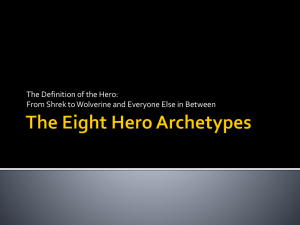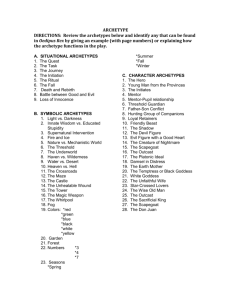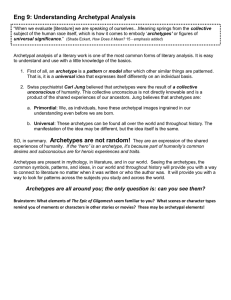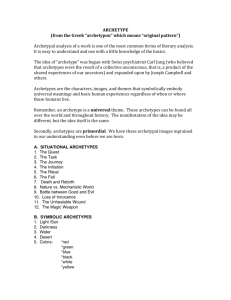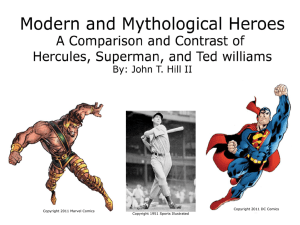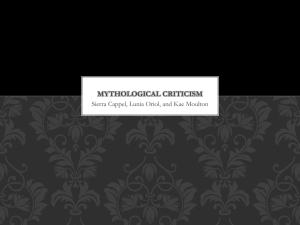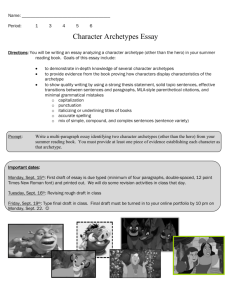Archetypes Definitions and Quotes
advertisement
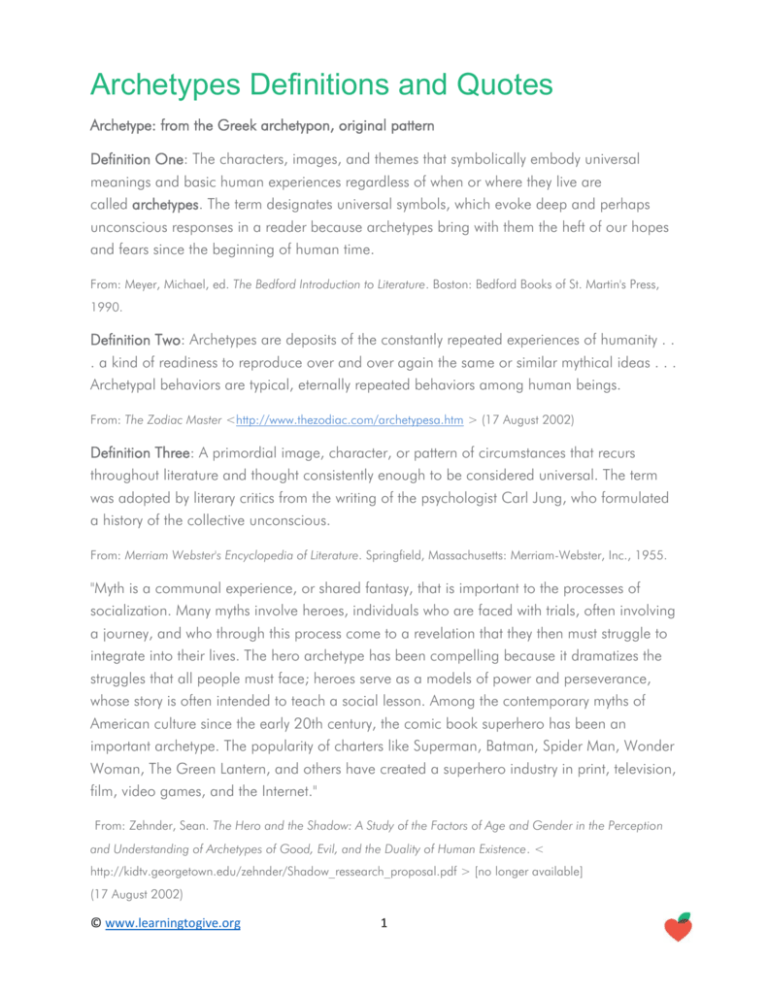
Archetypes Definitions and Quotes Archetype: from the Greek archetypon, original pattern Definition One: The characters, images, and themes that symbolically embody universal meanings and basic human experiences regardless of when or where they live are called archetypes. The term designates universal symbols, which evoke deep and perhaps unconscious responses in a reader because archetypes bring with them the heft of our hopes and fears since the beginning of human time. From: Meyer, Michael, ed. The Bedford Introduction to Literature. Boston: Bedford Books of St. Martin's Press, 1990. Definition Two: Archetypes are deposits of the constantly repeated experiences of humanity . . . a kind of readiness to reproduce over and over again the same or similar mythical ideas . . . Archetypal behaviors are typical, eternally repeated behaviors among human beings. From: The Zodiac Master <http://www.thezodiac.com/archetypesa.htm > (17 August 2002) Definition Three: A primordial image, character, or pattern of circumstances that recurs throughout literature and thought consistently enough to be considered universal. The term was adopted by literary critics from the writing of the psychologist Carl Jung, who formulated a history of the collective unconscious. From: Merriam Webster's Encyclopedia of Literature. Springfield, Massachusetts: Merriam-Webster, Inc., 1955. "Myth is a communal experience, or shared fantasy, that is important to the processes of socialization. Many myths involve heroes, individuals who are faced with trials, often involving a journey, and who through this process come to a revelation that they then must struggle to integrate into their lives. The hero archetype has been compelling because it dramatizes the struggles that all people must face; heroes serve as a models of power and perseverance, whose story is often intended to teach a social lesson. Among the contemporary myths of American culture since the early 20th century, the comic book superhero has been an important archetype. The popularity of charters like Superman, Batman, Spider Man, Wonder Woman, The Green Lantern, and others have created a superhero industry in print, television, film, video games, and the Internet." From: Zehnder, Sean. The Hero and the Shadow: A Study of the Factors of Age and Gender in the Perception and Understanding of Archetypes of Good, Evil, and the Duality of Human Existence. < http://kidtv.georgetown.edu/zehnder/Shadow_ressearch_proposal.pdf > [no longer available] (17 August 2002) © www.learningtogive.org 1 "The hero is an archetypal figure recorded in literature and other art forms throughout history in cultures from all around the world. Some of these figures take fantastic journeys that test their heroic strengths and worth. Other figures undergo tremendous suffering for some greater, heroic purpose. Some suffering figures reach a level of heroic transcendence in a victory over adversity and their own limitations. The nature of the figure may receive a different emphasis in different cultures, and in some cultures, at sometimes, the anti-heroic figure may defiantly be proclaimed as the dominant archetype. Another common archetype is the super heroic figure, who has exceptional strengths to balance against exceptional monsters and fear." From: http://www.gcsu.edu/acad_affairs/coll_artsci/int/hero.html (No longer available.) 'In "Peace on Earth," Superman is unable to meet his heroic goal, despite his good intentions. It's a common theme in Ross' work - heroes try to tackle impossible problems and fail, again and again, until they learn to embrace their limitations. "He, Superman, couldn't save the world because he's not intended to," Ross said. "The thing is that if any one person saves the world, it takes away human beings' need to improve themselves and basically fix their own selves and their own society." To that end, he believes that heroes like Superman best serve as inspirational figures to those of us in the real world. "Superheroes can be a phenomenal thing to portray, to both kids and adults, the very intentions of looking out for your fellow man," he said.' From: Alderman, Nathan. Alex Ross Interview <http://nathan.huah.net/writing/alexross.html> (21 February 2003) "Superheroes are worth reading about. They're worth writing about. They're powerful archetypal characters in larger than life, allegorical situations. Superman isn't just a guy in a cape who gets confused about which goes on first, the underwear or the tights: he's the altruistic impulse in all of us, the desire to help one's fellow man given flesh. Batman isn't just a guy dressed like a bat, he's the primal impulse for revenge, continually at war with his own more civilized nature and waling the edge of insanity on a nightly basis. These are powerful stories. These are important archetypes. They are worth writing about." From: Seavey, John. The Final Word < http://home.mn.rr.com/ofangs/harmoneye/orignon/finalword.html > [no longer available] (17 August 2002) © www.learningtogive.org 2
